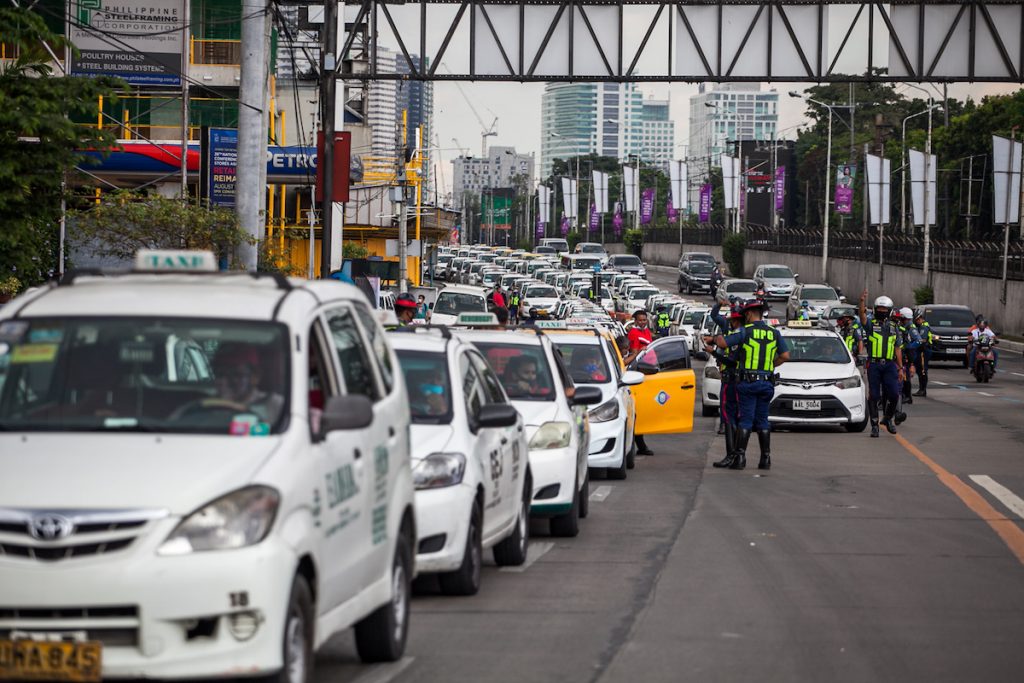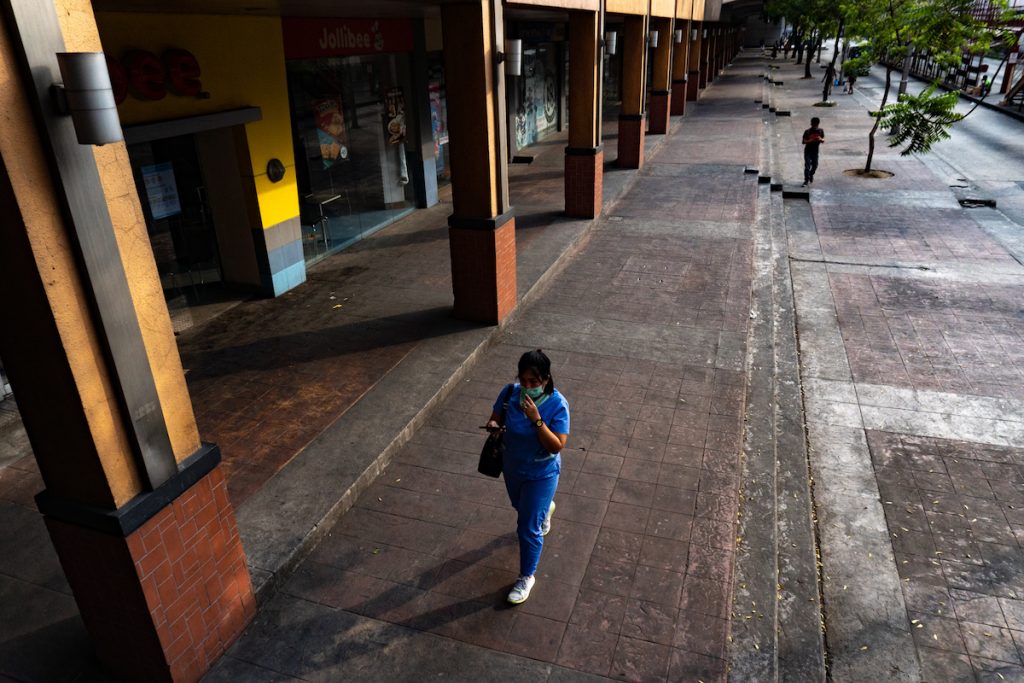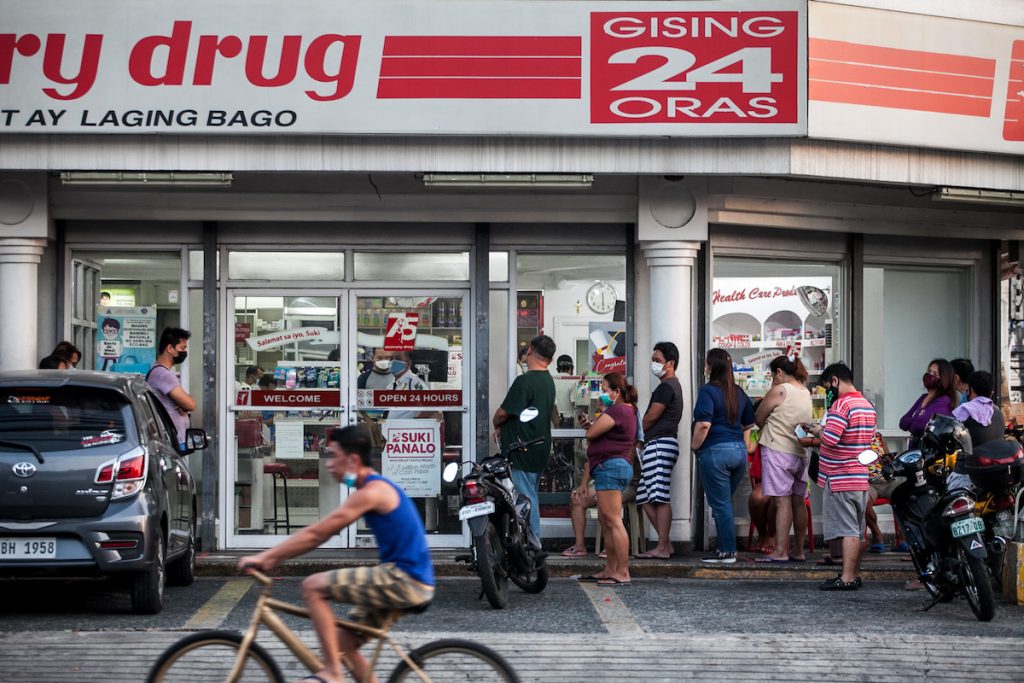A bottle of alcohol disinfectant is a priceless possession nowadays in the Philippines battling against the new coronavirus.
Instead of a firearm, security guard Nicko Gloriana holds a bottle of disinfectant while on duty outside a condominium building in the city of Mandaluyong in the country’s capital.
Gloriana’s main task is to signal people passing by the condominium’s driveway to stop and give way to entering and exiting vehicles. Since the government declared this week an “enhanced community quarantine” in the main island of Luzon, including the capital Manila, the 28-year-old guard decided to be stricter in his job.
Armed with a bottle of alcohol disinfectant, he signals people to stop and to show their hands to him. Then he pours drops of alcohol on the hands of those who heed the signal.
“This is a small way to help my fellow Filipinos fight the disease,” said Gloriana.
He said he does not worry if he runs out of alcohol, adding that the important thing is “we get a share of it even in a small amount and the chance to prevent the spread of the virus.”
Philippine President Rodrigo Duterte earlier announced the imposition of the enhanced community quarantine which aims to suppress the spread of COVID-19.
As of March 18, the disease has already claimed 17 lives and infected at least 202 people in the Philippines.
The community quarantine measures include a lockdown of the city where people are to stay home. Public transportation has been suspended, and only essential workers are allowed to go out.


Philippine authorities have apprehended hundreds of taxi and bus drivers who went out to work despite the suspension of all public transportation on the first day of the community quarantine.
The absence of mass transport has made it hard for health professionals, who are in the frontlines of the health crisis, to travel to and from work.
It was late in the afternoon when environmental activist Gerry Arances saw a post on Facebook about two nurses who were begging for a ride home.
Arances took his car keys, defied the strict implementation of the home quarantine, contacted the two nurses, and gave them a ride home.
He said he was aware of the risk because the nurses are “exposed to many diseases at the hospital and they are possible carriers” of the virus.
Arances, however, added that if there is no one who would help them get home and rest: “How can they go back to work and help treat those who are suffering because of COVID-19?”
He made sure he was somehow protected.
“I used a face mask and kept proper physical distancing. I also disinfected my car and myself after the ride,” he said.
The two nurses were “bewildered,” Arances said, adding that they were obviously very tired but “both were thankful and a bit apologetic for their situation.”
“I told them that there is no reason to apologize. After all, it takes a community to win the fight against this crisis. Giving them a ride is my share in this battle,” he told LiCAS.news.


Some of Arances’ friends called him crazy and foolish. “They said I am putting myself at great risk. I think they don’t understand. We cannot just sit while we know we can do something,” he said.
But not all criticized his actions. Many of his friends saw the importance of small acts of kindness in such times of crisis.
That evening, Arances and his colleague organized “Oplan Hatid” that calls on drivers and private car owners to volunteer and give stranded health workers a ride home.
“We are now coordinating it with the local government. We do not want to break the imposed quarantine, so we are seeking permission from the authorities,” he said.
In the city of Pasig, also in the capital, Mayor Vico Sotto lifted the ban on tricycles to help health professionals get to their destinations.
“Our risk assessment shows that we cannot completely ban tricycles at this point,” said the mayor.
“Health workers and other essential service providers who are exempted from the quarantine need to go to work,” he added.
Goodness of people
Ralph Anthony Valderamma, a 31-year-old nurse, has to walk from the hospital to his home. “It was really exhausting because I came from an eight-hour shift.”
During his day off on yesterday, Valderamma tuned up his bicycle that he plans to use to go to work.
While preparing to go to sleep, Valderamma received a text message from a friend offering his bicycle to him. “I said ‘thank you but I also have a bicycle,'” he said.
His friend replied and gave him another offer.
“Do you know how to drive? Use my car to go to work and fetch your fellow nurses if you want,” his friend said in a text message.
Valderamma again declined.
“I am very grateful, but I am also too shy. I don’t want to abuse his kind heart. I felt that it was too much,” he said.
The nurse said he never expected someone to offer things to him especially in these trying times, “times that a lot of us only think about our own welfare.”
“The fact that there are people willing to help you lighten the burden makes me feel that I am not alone and that we can win this battle,” said Valderamma.
He said people “who have the kindest of hearts are enough reason for me to do my job and serve the human race better.”


Message of Lent
Church leaders in the country have reminded Catholics of the real message of Lent, especially in the midst of the health crisis.
Retired Bishop Arturo Bastes of Sorsogon said many saints and heroes are born in the midst of crisis. “We need more of them.”
Bishop Bastes said acts of kindness no matter how small or big is “a supreme virtue of charity,” which is what the Lenten season wants to convey to Catholics.
“Words move and inspire but examples draw and attract,” said the bishop. “Let us ask God to give us heroes and saints.”
Bishop Broderick Pabillo, apostolic administrator of the Manila Archdiocese, said real fasting “brings us in solidarity with the sufferings of others.”
“This COVID-19 brings a lot of suffering,” he said. “I refer not only to the suffering of those afflicted with the virus … but to many who are in dire physical and economic need,” he said.
Bishop Pabillo urged the public to be in solidarity with the health care workers.
“They are in the frontline helping people, thus exposing themselves to the disease,” he said.
“Being in solidarity with them does not only mean to feel sorry for them. Solidarity challenges us to go out of our way to extend help to them,” said the prelate.
Bishop Roberto Mallari of San Jose said Pope Francis “reminds us during this time of crisis that we always remember the poor who are always the most affected.”
“During this lockdown, many Filipinos are struggling even to find their daily bread,” said the bishop. “God has given us this crisis as an opportune time to reach out to the poorest of the poor,” he said.
For security guard Gloriana, his task is “not limited in keeping the people inside the condominium safe.”
“I also have a responsibility to my fellow poor. I know how it feels because I am one of those who need these [disinfectant] to survive,” he said.


